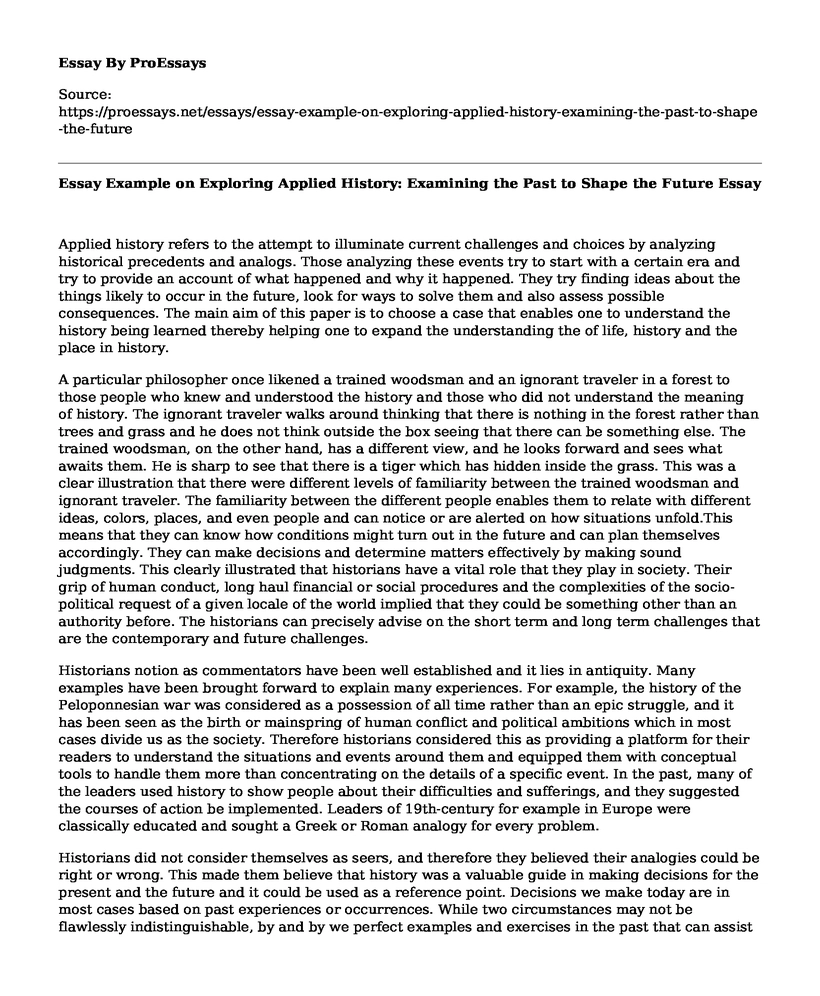Applied history refers to the attempt to illuminate current challenges and choices by analyzing historical precedents and analogs. Those analyzing these events try to start with a certain era and try to provide an account of what happened and why it happened. They try finding ideas about the things likely to occur in the future, look for ways to solve them and also assess possible consequences. The main aim of this paper is to choose a case that enables one to understand the history being learned thereby helping one to expand the understanding the of life, history and the place in history.
A particular philosopher once likened a trained woodsman and an ignorant traveler in a forest to those people who knew and understood the history and those who did not understand the meaning of history. The ignorant traveler walks around thinking that there is nothing in the forest rather than trees and grass and he does not think outside the box seeing that there can be something else. The trained woodsman, on the other hand, has a different view, and he looks forward and sees what awaits them. He is sharp to see that there is a tiger which has hidden inside the grass. This was a clear illustration that there were different levels of familiarity between the trained woodsman and ignorant traveler. The familiarity between the different people enables them to relate with different ideas, colors, places, and even people and can notice or are alerted on how situations unfold.This means that they can know how conditions might turn out in the future and can plan themselves accordingly. They can make decisions and determine matters effectively by making sound judgments. This clearly illustrated that historians have a vital role that they play in society. Their grip of human conduct, long haul financial or social procedures and the complexities of the socio-political request of a given locale of the world implied that they could be something other than an authority before. The historians can precisely advise on the short term and long term challenges that are the contemporary and future challenges.
Historians notion as commentators have been well established and it lies in antiquity. Many examples have been brought forward to explain many experiences. For example, the history of the Peloponnesian war was considered as a possession of all time rather than an epic struggle, and it has been seen as the birth or mainspring of human conflict and political ambitions which in most cases divide us as the society. Therefore historians considered this as providing a platform for their readers to understand the situations and events around them and equipped them with conceptual tools to handle them more than concentrating on the details of a specific event. In the past, many of the leaders used history to show people about their difficulties and sufferings, and they suggested the courses of action be implemented. Leaders of 19th-century for example in Europe were classically educated and sought a Greek or Roman analogy for every problem.
Historians did not consider themselves as seers, and therefore they believed their analogies could be right or wrong. This made them believe that history was a valuable guide in making decisions for the present and the future and it could be used as a reference point. Decisions we make today are in most cases based on past experiences or occurrences. While two circumstances may not be flawlessly indistinguishable, by and by we perfect examples and exercises in the past that can assist us with making better decisions. In the late decades, in any case, things have changed. The longstanding perspective on the history specialist as being, in modern day language, 'arrangement significant,' has dropped out of support and regularly excites doubt. Academic historians have now become specialists in their fields and are working on narrower fields, and this has thus made its applicability in this era narrow. They are in detail and therefore believe that history does not repeat itself as it is comprehensible to few scholars.
Conclusion
Most in a general sense, history instructs us to look past the fleeting and pursuit out the hidden, long haul elements of issues. As an issue of schedule, students of history test the underlying foundations of a circumstance and attempt to follow causalities. A chronicled attention to how states act towards territorial opponents and the effect of the retreat of old power coalitions has evident pertinence for arrangement stuck in unfortunate situation spots. Perhaps the most accessible tool offered by history is that of the enlightening analogy. What history specialists can do is to expose analogies to examination and judge whether they are suitable, given the distinctions and the likenesses between circumstances. Researchers can distinguish the most significant analogies and use them to advance the approach discussion. Related to analogy is precedent. History is a wellspring of points of reference that enlighten arrangement issues. Through their ability, students of history can make supportive derivations, test and challenge presumptions and dismantle an issue. The military is one of only a handful couple of organizations that reliably make 'applied history' a fundamental piece of their activity. Military foundations think about past fights and crusades to improve their execution in future clashes.
Cite this page
Essay Example on Exploring Applied History: Examining the Past to Shape the Future. (2022, Dec 27). Retrieved from https://proessays.net/essays/essay-example-on-exploring-applied-history-examining-the-past-to-shape-the-future
If you are the original author of this essay and no longer wish to have it published on the ProEssays website, please click below to request its removal:
- Paper Sample on Industrialization
- Contribution of Colonialism to Famine in South Sudan. Essay Example.
- Reconstruction Ideas Essay Example
- Greek Mythology: Trojan War Essay Example
- Essay Sample on Holocaust: Trauma & Unbearable Stress Beyond Human Coping
- Paper Example on Truman's Potsdam Ultimatum: Japanese Surrender with Retention of Emperor
- Free Education - Essay Example







